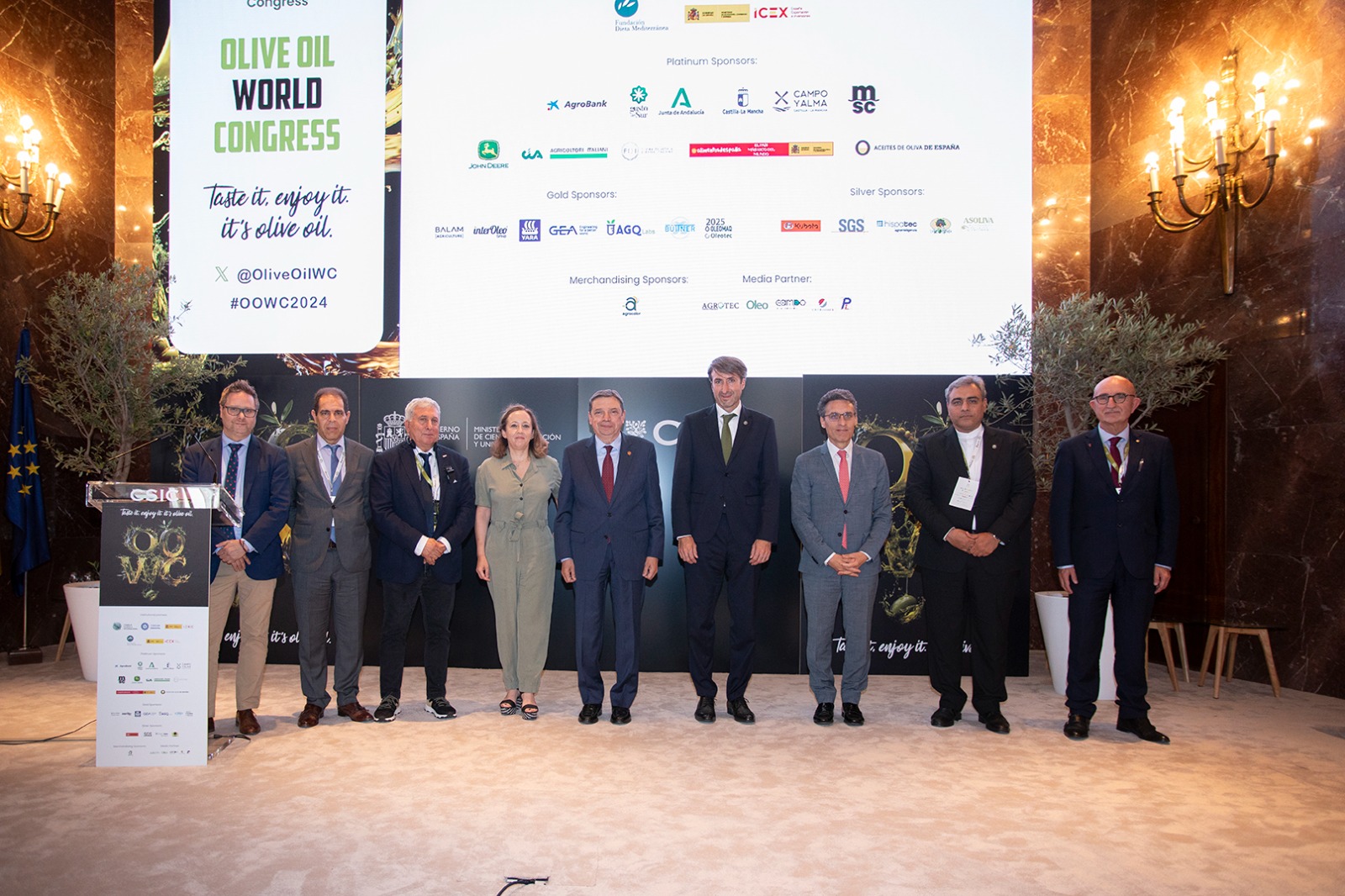
The last day of the first edition of the Olive Oil World Congress (OOWC) opened with the 'Trade and Consumption' block. Sponsored by AgroBank, it was attended by Manuel Parras, professor at the University of Jaén; and Ignacio Ballester, deputy general manager of MSC Spain, among others.
In the presentation 'Analysis of the consumption strategy in business development', Parras indicated that it is crucial to target three specific segments: young people, whose per capita demand is significantly lower than that of previous generations; the catering channel, which in general consumes little olive oil, especially in a context of high prices; and public administrations, which should use olive oil in establishments where food is prepared and served.
It was the turn of the first round table, entitled 'Olive oil consumption in the world', moderated by María Juárez, head of the Economics and Promotion Unit of the International Olive Oil Council (IOC). David Valmorbida, president of the Australian Olive Oil Association (AOO); Joseph Profaci, executive director of the North American Olive Oil Association (NAOOA); Di Yang, representative of the Food and Agriculture Organization of the United Nations (FAO); Antonio Gallego, president of the Spanish Association of the Olive Oil Exporting Industry and Trade (ASOLIVA); and Gennaro Sicolo, president of the Confederazione Italiana Agricoltori (CIA) took part in the event.
During the intervention, each panellist analysed olive oil consumption from the perspective of their country. Topics such as local consumption trends, specific challenges in the promotion and export of olive oil, and strategies to increase the acceptance of the product in different markets were discussed.
This was followed by a round table discussion on 'Prospects for the olive sector in the southern and eastern Mediterranean countries', moderated by Lhassane Sikaoui, head of the Olive Growing, Olive Oil Technology and Environment Unit at the IOC. Participants included Wafaa El Khoury, Head of Service for Near and North Africa, Europe and Central Asia at the Investment Centre of the Food and Agriculture Organization of the United Nations (FAO); Ayça Akça, researcher at the Tuzmir Olive Research Institute; Monji Msallem, researcher at the Olive Institute in Tunisia; Sara Oulbi, researcher at the National Institute for Agricultural Research in Morocco; and Abdessalem Loued, Chairman of the IOC Advisory Committee.
The experts addressed the current state, challenges and opportunities in these Mediterranean countries, as well as exploring how socio-economic and environmental conditions influence production.
This block closed with the presentation 'The best solution for the transport of olive oil around the world', given by Ignacio Ballester, where he explained the latest innovations in packaging materials and transport techniques that protect the quality of the oil and improve logistical efficiency.
In the next segment, called 'Olive oil and health' and sponsored by the Junta de Andalucía through its brand 'Gusto del Sur', participated Dr. Miguel Ángel Martínez, professor of the Faculty of Medicine at the University of Navarra; Dr. Antonio Escribano, Professor of Sports Nutrition at the Catholic University of Murcia; Rosa María Lamuela-Raventós, Professor of the Department of Nutrition, Food Sciences and Gastronomy of the Faculty of Pharmacy and Food Sciences of the University of Barcelona; Dr. Ramón Estruch, President of the Scientific Committee of the Mediterranean Diet Foundation; Dr. Fernando López, researcher of the 'Cordioprev' study (2022); and Francesco Visioli, Professor at the University of Padua.
Martínez offered an analysis on 'The role of olive oil in the contemporary Mediterranean diet', emphasising its relevance as the "flagship" of this diet, "the best supported by scientific evidence".
Escribano, for his part, claimed that olive oil is rarely associated with physical activity. However, its consumption among athletes can improve performance, muscle recovery, cardiovascular health, oxidation levels, endurance and inflammatory processes derived from exercise. These benefits are not only limited to elite athletes, but are also relevant for those who frequent gyms, go jogging, walking or simply climb stairs.
The block concluded with the round table 'Olive oil, cardiovascular health and other research', in which participants agreed that olive oil is crucial for promoting cardiovascular and general well-being. The experts emphasised its relevance within a balanced diet, highlighting its health benefits and its integration into the Mediterranean diet as an essential element.
In addition, Luis Planas Puchades, Minister of Agriculture, Fisheries and Food of the Spanish Government, was in charge of closing the OOWC. "Olive oil is one of the fundamental pillars of our Mediterranean diet, not only as a food, but also as a reflection of our culture," he said.
Under the slogan 'Taste it, enjoy, It's olive oil', the OOWC is organised in collaboration with AgroBank, MSC, CIA-Agricoltori Italiani, John Deere, the Ministry of Agriculture, Fisheries and Food through its strategy #alimentosdEspaña, the Interprofesional del Aceite de Oliva Español, the Junta de Andalucía through its brand 'Gusto del Sur', Filiera Oleicola Olearia Italiana and 'Campo y Alma', the food quality guarantee brand of Castilla-La Mancha, as Platinum sponsors; Grupo Interóleo, Büttner, Yara International, GEA, OLEOMAQ-Oleotec, AGQ Labs and Balam Agriculture as Gold sponsors; the company Kubota, Hispatec, Asoliva, Todolivo and SGS as Silver sponsors; Agrocolor as other sponsors. Agrotec, Voz do Campo, Puglia Live, Grupo Joly and Oleo are the Media Partners of the OOWC.
Link to download image resources: https://we.tl/t-b47vtrKlq1
